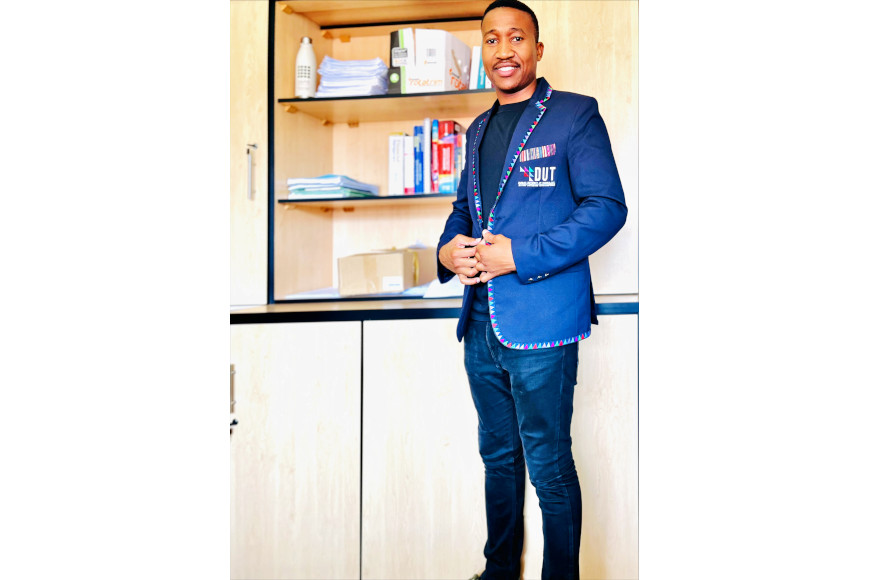The Academic Induction Programme serves as an integral platform for the professional development of newly appointed academic staff at the Durban University of Technology (DUT), also offering them a comprehensive introduction to the policies, procedures, and practices of the university. Grounded in both local (institutional and national) and global contexts, the programme aims to cultivate critically reflective and reflexive, scholarly practices within the higher education landscape, with a particular emphasis on fostering transformation and social justice. DUT Communications team, Sibahle Ngcobo spoke to the newly appointed Financial Accounting lecturer Thobelani Thango. He has just completed the first part of the Academic Induction programme offered by the Centre for Excellence in Learning and Teaching (CELT) and is ecstatic about his new role at the university.
The Academic Induction Programme is scheduled biannually, once per semester, each programme spans a six-month period. Within each semester, the programme structure consists of a face-to-face 3.5-day block workshop supplemented by monthly follow-up sessions. These workshops serve as spaces for engaging in critical discussions surrounding key imperatives in higher education, contextualised within institutional, local, and global frameworks. Furthermore, the programme underscores a holistic focus on the academic role with research and community engagement as key pillars of higher education also included as important sessions in the programme.
Integral to the programme is the incorporation of the student voice, as fostering student agency and success is paramount. Participants have the opportunity to engage with students, who share their experiences and perspectives, enriching the learning process.Aligned with the scholarly focus of the programme, participants are encouraged to inquire into their educational practices and present their reflections at a Sharing Day held at the programme’s conclusion. This platform allows for the exchange of insights and ideas aimed at enhancing pedagogical approaches and overall academic practices, fostering a culture of continuous improvement and excellence.
Thango has been part of the Centre for Excellence in Learning and Teaching (CELT) during his days as a student, tutoring students who needed assistance with their studies. He initially pursued Financial Accounting as an undergraduate student before transitioning to Management Accounting for his postgraduate studies, which also included his master’s degree.
Q: How has your journey been since you joined DUT?
“My journey encompassed both positive and challenging experiences. Initially, as an undergraduate student, I grappled with funding frustrations, requiring me to have an exceptional academic performance (distinctions) to qualify for Undergraduate Scholarship Award Scheme (USAS) assistance. This criterion positively influenced my academic achievements, culminating in my attainment of cum laude honours. Enrolling at DUT proved highly beneficial for shaping my entire career. My time at DUT also revealed a stronger inclination towards academic pursuits, prompting me to realise that my interests lie more in the academic realm.”
Q: What made you attend the tutorials that were organised by CELT?
“I engaged with tutors to address areas I had missed in class or during personal studies. Tutorials proved highly beneficial, particularly for participating in additional study activities.”
Q: How has your journey as a CELT tutor been?
“It has been an exciting journey exploring a variety of positive institutional activities. Tutoring, mentoring, and engaging with students have been the most thrilling experiences. However, it was not only about tutoring; we also participated in various activities that kept us closely connected to working with students, such as orienting first-year students. I enjoyed engaging on some challenging activities. Those that triggers analysis than generic. I developed a basic understanding of the cohort of students we normally have, which make it easy to think and play around significant activities that will ensure we produce Creative, Distinctive, and Impactful graduates.”
Q: Which students were you tutoring?
“I was tutoring Economics 1 (Module 1 and 2), students from Economics department.”
Q: How do you feel on being appointed as the new DUT lecturer?
“I am thrilled about this opportunity in academia, recognising there is much more to achieve. My motivation stems from witnessing the accomplishments of my colleagues. Above all, I am excited to be appointed in a department led by Professor Ferina Marimuthu, who encourages me to strive even harder for greater achievements. I feel excited to be in the good gospel of ENVISION2030, which is a cornerstone to shape the future of our students, academics, and me as an individual.”
Q: What was the message do you wish to relay to future students?
“Hard work will always pay off. There is no substitute for hard work. Students must be determined to achieve greater heights. Also, just know what you like, enjoy, and then have a person you look up to then seek information. To reflect on a few comments from peers and others, I encountered discouragement from many who believed pursuing my masters degree would not lead to employment. Surprisingly, my masters has opened doors for entry-level positions in academia. In addition to my academic achievements, I have acquired corporate experience as a merchandise manager in Gauteng and North West, thanks to my degree. The lesson learned is that students should seek advice from individuals who have walked a similar path and are further along in their careers, rather than those who lack relevant experience in the journey.”
Pictured: The newly appointed Financial Accounting lecturer, Thobelani Thango.
Sibahle Ngcobo

